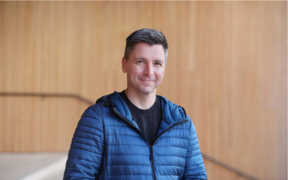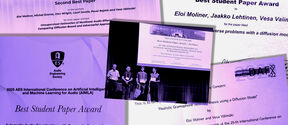Open Education of the Year Award for Generation AI Project

According to the awardees, the Generation AI project is very timely, the materials are openly available and based on co-creation, which is why it was decided to award the Open Educational Prize for the year to this project.
Generation AI is a multidisciplinary research project funded by the Strategic Research Council (STN), which is one of the projects of the SHIELD program. It provides research-based tools and learning suites to help children and young people learn to understand the operation of artificial intelligence and social media, invent and develop their own AI-based applications, and critically evaluate the personal and societal impacts of AI-based technology.
Open applications to support teaching AI skills
One of the basics of the award was the "Letable Machine" visual application developed in the project, which allows students to create proprietary classification applications without programming skills. Users go through the entire machine learning workflow, starting from data collection to the application. The tool is responsive, secure and accessible – and published with an open code MIT license. The machine to be taught supports a total of eleven languages, including Finnish.
Another key innovation is a social media simulator using "Some Machine" -- exploratory AI (XAI). It makes visible hidden mechanisms, such as data collection, profiling and testimonialing on which social media activity is based. The tool was launched in spring 2025 together with a comprehensive learning materials package. Some machine is available in Finnish and English.
Applications and supporting educational materials have been developed in conjunction with teachers and pupils.
The Generation AI project develops tools and educational materials to support them together with children and young people and teachers. Three years of collaboration have gathered teachers, students and researchers to jointly design, implement and evaluate learning modules and teaching technologies suitable for school education that support data delivery for children and young people.
“Unactical intelligence technologies are increasingly part of our daily lives. We think that everyone should understand some of the key principles of artificial intelligence so that they can use it consciously, critically and responsibly, and feel they can influence their own digital world and future, says Prof, the responsible leader of the project. Matti Tedre from the University of Eastern Finland.
Teemu Roos, Professor of Computer Science at the University of Helsinki, is the leader of a technology development work package in the Generation AI project.
Kaiju Kangas, Associate Professor of Education, is the director of the work package on epistrophy (TP3) in the project.
The award is the third prize of the project in a year; previous awards for conferences IEEE ICALT 2024 and AACE EdMedia 2025.
Learn about tools and materials:
This news item was originally published in Finnish on the University of Helsinki website on 27.5.2025
Read more news
A survey on users' experiences of Mykanta in collaboration between Aalto University and Kela
Senior university lecturer Sari Kujala's research group is exploring, in collaboration with Kela, users' experiences with the Mykanta online patient portal and the MyKanta mobile application.
Specialised AI models could be Finland's next global export
Finland has the potential to build AI solutions that are different from ChatGPT-like large language models. Aalto University's School of Electrical Engineering already has decades of experience in developing specialised, resource-efficient AI models. They could be a key component of future 6G networks, automation, and industrial systems – and the next competitive edge of our country.
Professor Patric Östergård becomes a member of the Finnish Society of Sciences and Letters
Finnish Society of Sciences and Letters is Finland's oldest science academy. It promotes scientific discussion, publishes scientific literature, awards prizes and provides financial support for research.